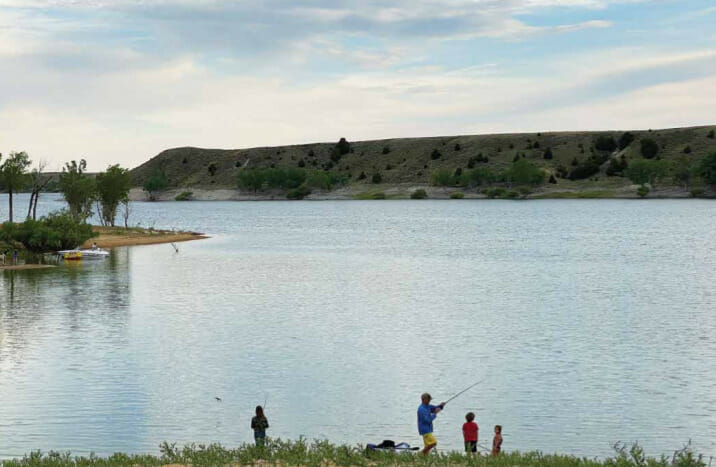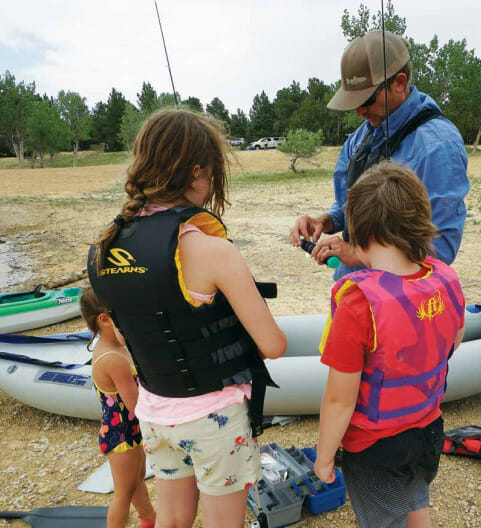Photo by Christine Peterson
The brother and sister—ages 8 and 11—fired off one question after another.
“What’s a sinker for?”
“What’s a bottom bouncer?”
“How does it work?”
“What are we going to catch?”
They’d never been fishing before. They wanted to know everything. Their instructor that day, my husband, put on his middle-school-science-teacher face, and started explaining.
Minutes later, the three loaded in our inflatable kayak and pushed off into Glendo Reservoir, a 12,000-acre bucket in eastern Wyoming created largely to store water for Nebraska irrigators.
I nestled in the sand next to the siblings’ parents to talk about fishing. They’ve been close friends of mine for most of my adult life, but this was the first time we’d been fishing together.It was the first time the kids’ mom, Sarah Purdy, had been a fishing trip since her parents drug her down the Kenai River as a teen in Alaska. Josh Wolfson, Sarah’s husband, had gone a few times as an adult. He caught himself in the back of the head with his fly the first trip. The next few weren’t markedly more successful.
These were backyard-barbecue, beer-and-a-conversation friends, not backpacking-trip-with-fly-rods friends. Yet here we were, on the shores of a reservoir talking about fishing. All because of a pandemic.
COVID-19, which as of the end of February had killed more than half a million people in this country alone, upended life for nearly everyone in the world. In the course of a year the economy tanked, schools went virtual, businesses shuttered and hospitals overflowed. Summer Camp closed, movie theaters stopped playing and swimming pools locked their gates. Parents were at a loss.

And so many, like Josh and Sarah,decided perhaps fishing could be an answer.
“It’s right down the road, and my friends are doing it. We thought we’d give it a try,” Josh said, adding that his kids had been asking to go. “It’s also the social piece of fit. It’s a safe,outdoor activity. We could be with our friends and socialize.”
“It was also a very low price point to enter,” Sarah added, noting she’d spent $40 total on a rod and tackle box.
Is this what fishing used to be? Instead of hundreds of dollars on guides and thousands of dollars on equipment, stone-faced, leave-me-be faces and holier-than-thou lectures about fishing ethics, was fishing once a couple kids, some cheap gear and an adult or two willing to show them the ropes? Was it once a venerated part of cultures, as much a religion for entire extended families as a group of guys on a weekend getaway? Could a global pandemic that uprooted almost every aspect of life bring us back to those roots? The numbers and the anecdotes say yes… maybe.
The surge
We’ll go over the big numbers first. In 2020, about 9.7 million more people in the U.S. started fishing than the year before, according to data from the Recreational Boating and Fishing Foundation.
“They are made up of many young families, skew Hispanic and from urban areas across the country. For them, fishing represents peace, relaxation and family time, and is a great opportunity to make memories and show-off on social media,” the report reads. “These consumers were introduced to fishing through family and friends, because of cancelled summer events and because of advertisements.”
Sure, 9.7 million sounds like a lot, but how does that compare to the number of people already fishing? It’s well over half. In 2020, there were 14.6 million “experienced anglers” in this country. New anglers spanned races, almost 60 percent were women, and about 15 percent were Hispanic.
Take Patricia Châu Nguyễn. Prior to the pandemic, Patricia lived in Los Angeles, working for UCLA as the senior director for diversity programs and swimming in the ocean. She wasn’t fishing. Then COVID hit, her roommate moved out, and she and her partner decided to live, at least in part, on the road.
Her partner, outdoor photographer Ryan Duclos, brought along his fly rod.
“I didn’t realize the complete Zen he would be in,” she said. But even then, fly fishing felt like “an old dude’s thing to kill time,” and in fly shops with her partner she may as well have been invisible.
“They are made up of many young families, skew Hispanic and from urban areas across the country. For them, fishing represents peace, relaxation and family time, and is a great opportunity to make memories and show-off on social media.”
2020 Recreational boating and Fishing Foundation Report
A few months into her work from home, she met Erica Nelson, an avid angler in Colorado and creator of the popular Awkward Angler Instagram account and podcast.
“Erica took a lot of the performative perfection on the river out of it,” she said. “Her waders had a beer. She made it so chill.”
Patricia also began digging into the importance of fishing in her Vietnamese culture.
“The Moon Festival for Vietnamese has a lot of fishing connection,” she said. “There’s nuances to fishing I didn’t understand as a kid when I carried a stick with a fish lantern on it. Now fishing is a journey to explore my own heritage that has been inaccessible to me.”
All because of COVID.
Retention
But now that the summer of 2020 has passed, vaccines are rolling out by the millions, and families are making summer plans again. The question remains: Will the new anglers stay? Will they be what the fishing industry needs to force it to be more accessible?
“Some people won’t come back,” said Stephanie Vatalero, the Recreational Boating and Fishing Foundation senior vice president of communications. “But fishing did have a resurgence, if you will, a renaissance in that other things weren’t competing for their time, and it checked a lot of boxes of something to do during the pandemic safely.”
Non-anglers, or those who haven’t tried it yet, tend to imagine fishing has a large barriers to entry with pricey equipment and days spent on the water. Bu t2020 taught many new anglers that a Wal-Mart rod and tackle box is all they really need to add fishing to a weekend camping trip. And many will continue. Josh and Sarah said they’d likely keep fishing a part of their summer—at least as an add-on to camping or other outside fun. Patricia goes fishing nearly every day.
One caveat remains, however. All three noted, as did those surveyed by the Recreational Boating and Fishing Foundation, that a more knowledgeable tutor makes all the difference. Which means while a global pandemic might have started this renaissance in fishing, it still requires all of us to invite our non-fishing friends to the lake or river and keep it going.



